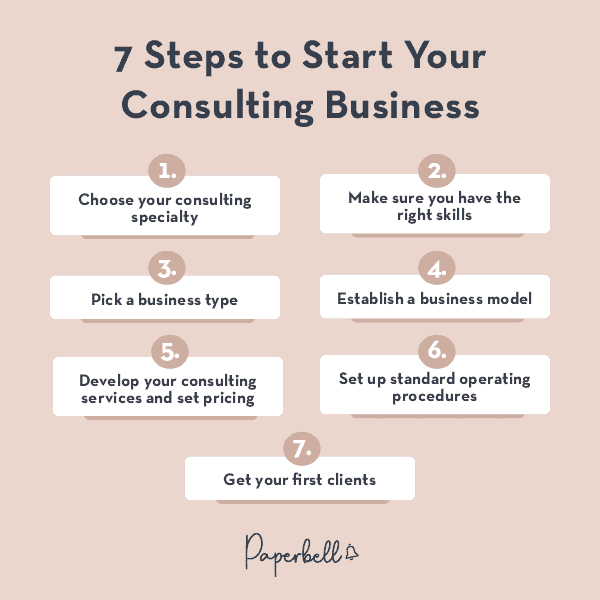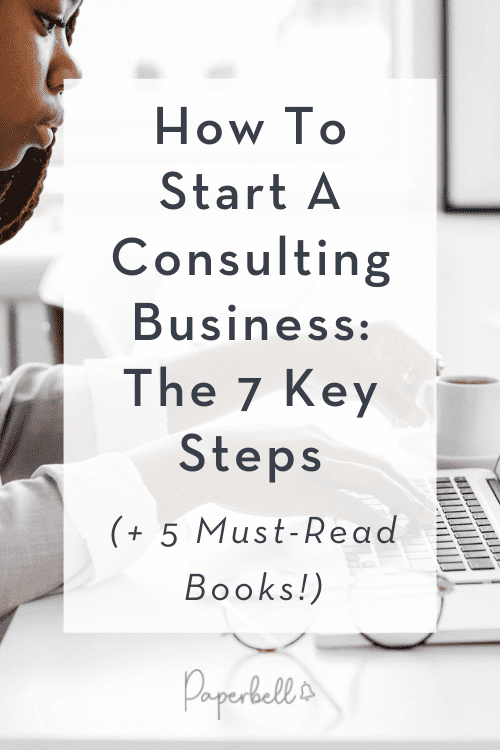Starting a consulting business can be a rewarding shift in your career. It allows you to share your expertise and help businesses achieve their goals.
From choosing your niche to attracting clients, this guide will cover everything you need to know to get started on the right foot and build a successful consulting practice.
How to Start a Consulting Business in 7 Steps

1. Choose Your Consulting Specialty
Consulting has many specialties. Your background should give you a hint about your edge in terms of what you can serve clients with, such as marketing, HR, or high-level business strategy.
Consider the types of clients you want to work with, too. Small businesses have completely different problems and require different solutions from multinational corporations.
Here are more popular consulting specialties you can choose from:
- Finance
- Human Resources
- Business Strategy
- Operations
- Information Technology
- Marketing
Choose an area where you are most curious to deepen your knowledge and problem-solving skills over time.
[Read: 14 Famous Consultants and How They Became Superstars]
2. Pick up the Right Skills
Here are some essential skills for consultants:
- Public speaking (since you’ll be speaking to clients and their teams regularly)
- Identifying business problems
- Presenting data in a concise way
- Offering feedback
- Training people to implement solutions
You don’t need to ace all of these to get started. You can hone your skill set as you gain experience. But you should have a basic grasp of these at a minimum.
Determining your strengths and weaknesses is a great way to direct your focus to the right learning areas.
3. Register Your Business
Do you want to work as an independent consultant? Or do you see yourself growing a large team of professionals? Your business vision will tell what company you should register for your consulting practice.
- If you’re going solo, all you need to do is become a sole proprietor with none to minimal costs.
- If you want to hire people (as employees), you’ll need to register a Limited Liability Company (LLC). This will take a one-time filing fee and annual fees to maintain it.
Even if you’re on your own, you can still opt to make your business an LLC. This legal structure will make your business a liable entity, which means you personally won’t be liable for anything that happens to your clients.
Here are a few other things to keep in mind when setting up your business:
- Understand your legal business requirements: Check state-specific licenses and permits for consultants.
- Get clear on taxation: Research current tax rules for self-employed individuals in your state and understand deductible expenses for your consulting business.
- Get business insurance: Secure appropriate insurance before taking on clients to manage potential risks.
- Get a business bank account: Consider separating business finances with a dedicated account and getting a credit card for startup expenses.
4. Write a Business Plan
First, choose a business model. This step will dictate how you’ll make money from consulting. Here are some examples:
- Hourly: Charging for each hour you spend on a project.
- Per project: Billing a flat fee for a predetermined scope of work.
- Retainer: Charging a flat weekly or monthly fee.
One isn’t better than the other—it all depends on what works best for you. It’s also possible to work with all three models depending on the type of project.
Next, create a solid business plan. If you plan to make consultancy your main income source, you want to ensure that your business can turn a profit.
A consulting business plan may contain the following sections:
- A summary that outlines exactly what your business will do and how it will achieve those goals.
- An overview of the type of consulting service your business provides.
- An analysis of your industry: Is there a current gap in the market for people with your expertise? What is the size of the market you’re targeting?
- Customer analysis: Who will your clients be? For this, you can interview potential clients to understand their needs deeper.
- Competitive analysis: An overview of what other consulting businesses are doing and whether or not it’s working. This will give you new ideas about how to make your offer more unique. Consider using web scraping techniques to gather this competitive intelligence efficiently.
- Financials: Define your startup costs and where your income will come from. How many clients do you need to become profitable? Will you need external funding?
- Marketing plan: Lay out the marketing strategies you want to use to get clients, such as cold outreach, search engine optimization, paid ads, or referrals.
5. Develop Consulting Packages
Consider who you want to help in your niche and what they need. What are their deepest pain points? What outcomes do they want the most? How can your expertise create a bridge between those challenges and outcomes?
To turn your solutions into a clear-cut package, put some structure behind it. Consider whether you want to offer one-on-one sessions, strategy development, follow-up support, or a combination. Define the time frame of your collaborations and how much you charge for them.
If you want to make this simple, you can set up custom packages through Paperbell. It’s an all-in-one platform for service providers where you can sell your consulting packages and manage your clients.
[Read: The 7-Step Consulting Proposal Template That Wins Clients]
Plus, Paperbell can also handle the rest of your business, which leads us to…
6. Set up Your Business Processes
Putting the right processes in place lets you save time and deliver high standards to your clients repeatedly.
It also makes it way easier to outsource some of them.
To get started, you can use Paperbell to build the entire back end of your consulting practice! For example, you can:
- Create templates for onboarding emails so you never have to draft an email from scratch again.
- Set up your schedule so your clients can book appointments in your calendar.
- Design templated intake questionnaires.
- Create feedback forms to constantly know what your clients think of your consulting services.
- Automate invoice sending and reminder emails.
Clear processes will not only make you appear more professional but also keep you focused and let you remain in your zone of genius.
If your business grows significantly and you start to hire employees, having standard procedures in place will help to onboard them and ensure they complete work to the same standard as you do.
7. Get Your First Clients
Starting with organic marketing before you get an advertising budget will initially keep your costs low. Contact your existing network and let them know you’re open for business. Ask people in your circle to recommend you.
If you have a big enough network, you can build a consulting business through connections alone. Attending networking events in your niche can help you extend that network.
To keep your flow of clients sustainable, it’s a great idea to start building an email list. Sharing valuable content will help you get your name out there and tell potential clients about your offers.
Never underestimate the power of social media marketing to share your expertise. If you establish yourself as an expert in your niche, clients will find you rather than you needing to find them.
Once you have your first clients on board, go above and beyond to provide a consulting experience that wows them. If you’re confident they’re happy with your services, make sure to ask for a testimonial. These will be powerful tools you can use to keep growing your consulting business.
5 Mistakes to Avoid When Setting Up a Consulting Business
Building a consulting business has its pitfalls, so avoid these common mistakes.
1. Having an Undefined Niche
Going too broad in the beginning can set you up for failure. You want a specific niche and target clients to ensure you can differentiate yourself from competitors in the consulting industry.
If you have a clear area of expertise and can establish yourself as a thought leader in that area, people will seek out your services, and you won’t even need to spend money on marketing yourself.
2. Skipping Market Analysis
Bringing your business to market without proof that people need your services is risky. We tend to assume we know what people want, but we can’t be sure unless we ask.
So, speak to your potential clients and understand how you can help solve their problems before rushing to launch.
3. Underestimating Financial Planning
Setting your prices too low or not anticipating all your costs can lead to debt before you’ve even got your business off the ground. Conduct a thorough financial analysis to ensure you charge what you’re worth and make a profit. It’s better to budget higher for your costs to avoid surprises.
4. Not Establishing Processes
If you start your consulting business without processes, you won’t be able to sustain it as you grow. Creating systems for client management, invoicing, and project delivery can ensure you can build trust with your clients and always provide a seamless experience for them.
5. No Marketing
Sharing your website on LinkedIn and hoping your dream clients stumble upon it isn’t a strategy. You need well-planned and executed marketing efforts to get your message in front of the right people.
Word of mouth usually isn’t enough for consultants alone, so use a variety of ways to reach your audience and get a consistent influx of leads.
By avoiding these common mistakes, you will build a consultancy business with a strong foundation and increase your chances of sustainable growth.
Your Checklist to Starting a Consulting Business
Here’s a quick checklist to keep track of what you need to do to start your consulting business:
- Pick a consulting niche.
- Fill the gaps in your expertise.
- Register your business.
- Choose a business model.
- Write a business plan.
- Create consulting packages.
- Sell your packages on a platform like Paperbell.
- Let your network know you’re open for business.
- Come up with a marketing strategy.
- Ask your first happy client for a testimonial.
FAQs about Starting a Consulting Business
How Much Does it Cost to Start a Consulting Business?
You can start a consulting business with minimal costs by leveraging your existing skills, network, and a basic online presence like a simple website or social media profile. This approach might only cost a few hundred dollars.
However, if you want to invest in professional branding, a comprehensive website, marketing campaigns, and specialized tools, your startup costs could rise significantly, potentially reaching thousands of dollars.
How Do I Start Off as a Consultant?
TLDR? Start a consulting career by defining your niche, building your expertise, setting up your business structure, and networking to attract clients.
Do I Need a Website to Start a Consulting Business?
While not mandatory, having a website enhances your credibility, helps attract clients, and serves as a hub for your services and content.
Your Consulting Business Journey Starts Today
Starting a consulting business may seem overwhelming at first, but breaking it down into manageable steps makes the process clearer. Remember that every successful consultant started exactly where you are now—with expertise to share and the courage to put themselves out there.
The beauty of consulting is that you can start small and scale gradually as you gain confidence and clients. Focus on delivering exceptional value with each project, and your reputation will grow naturally over time.
While building your business, remember to invest in tools that simplify the administrative side so you can focus on what you do best—providing transformative insights to your clients. Paperbell helps you create a professional online presence while handling all your scheduling, payments, contracts, and client management in one seamless system.
Ready to start your consulting journey? Take that first step today, and watch how your expertise can transform both your career and your clients’ businesses.

Editor’s Note: This post was originally published in July 2023 and has since been updated for accuracy.









